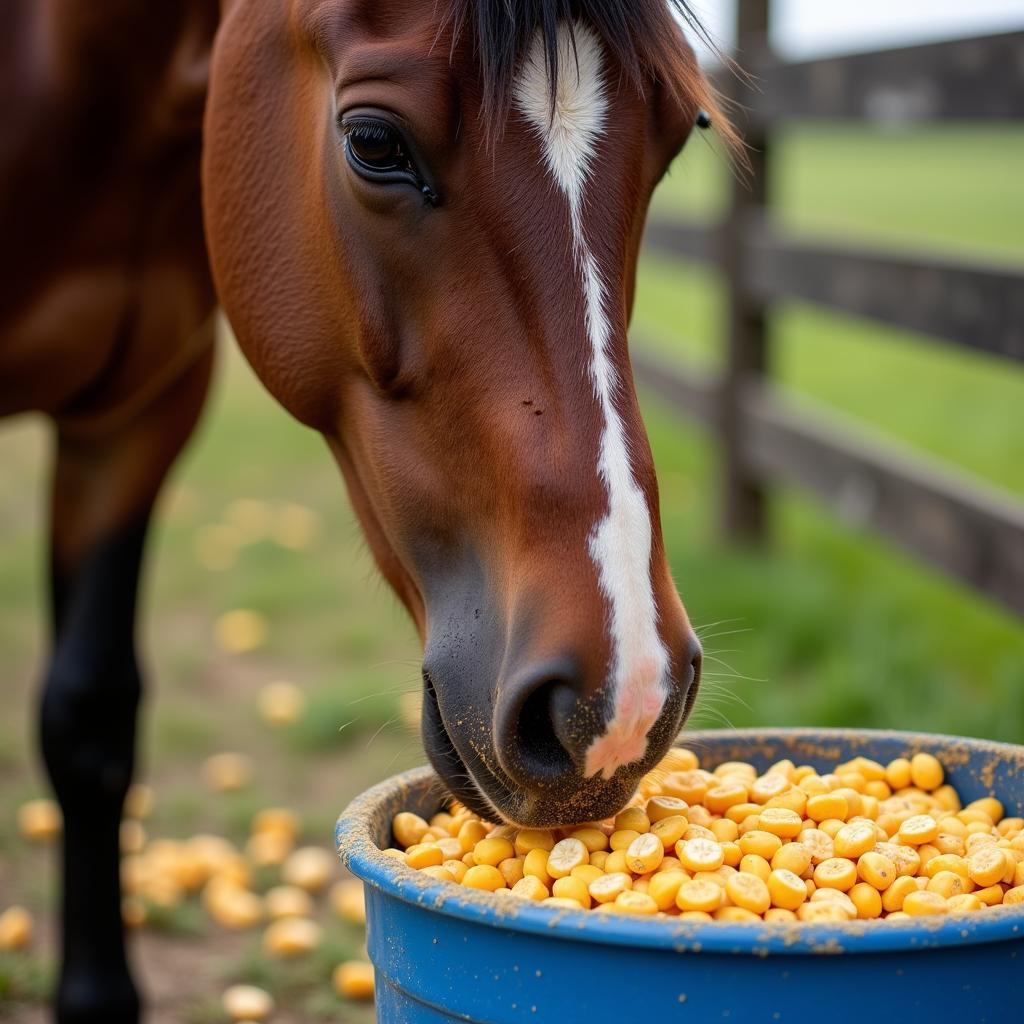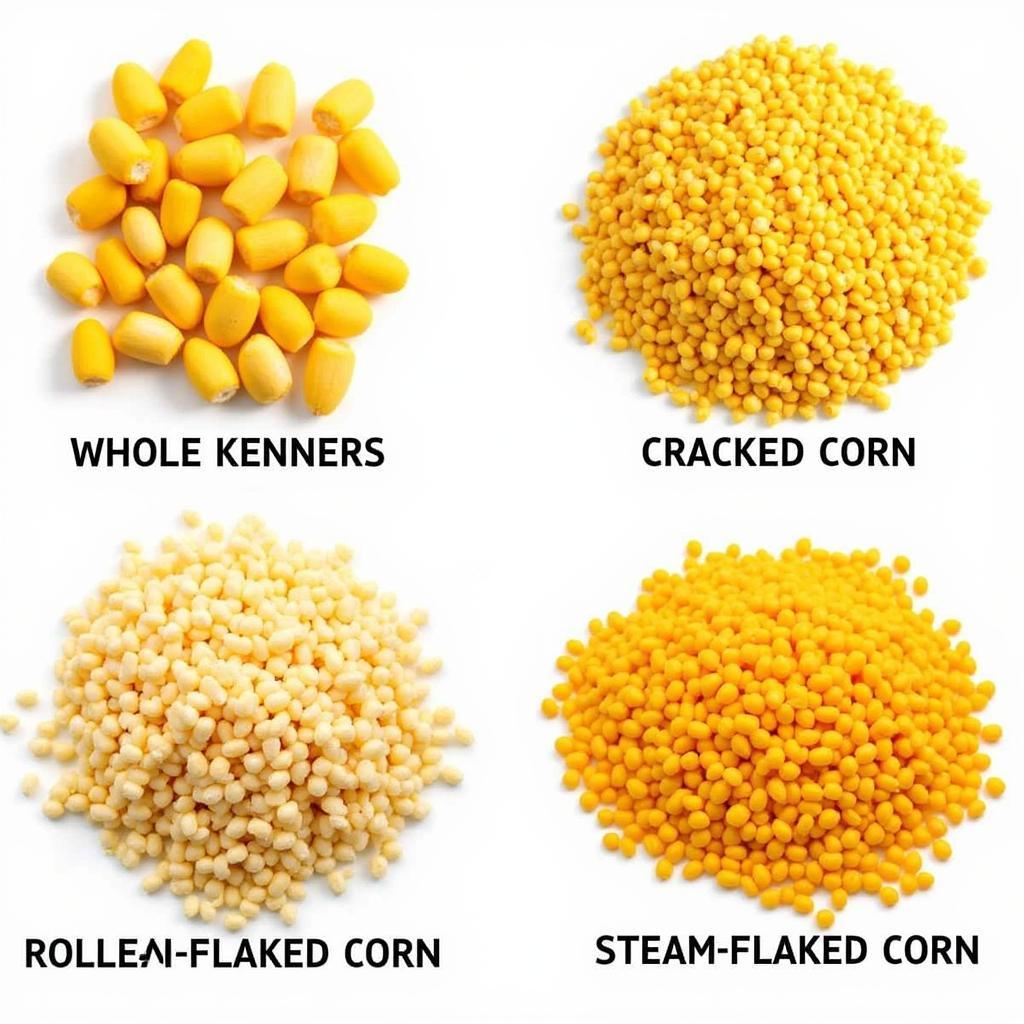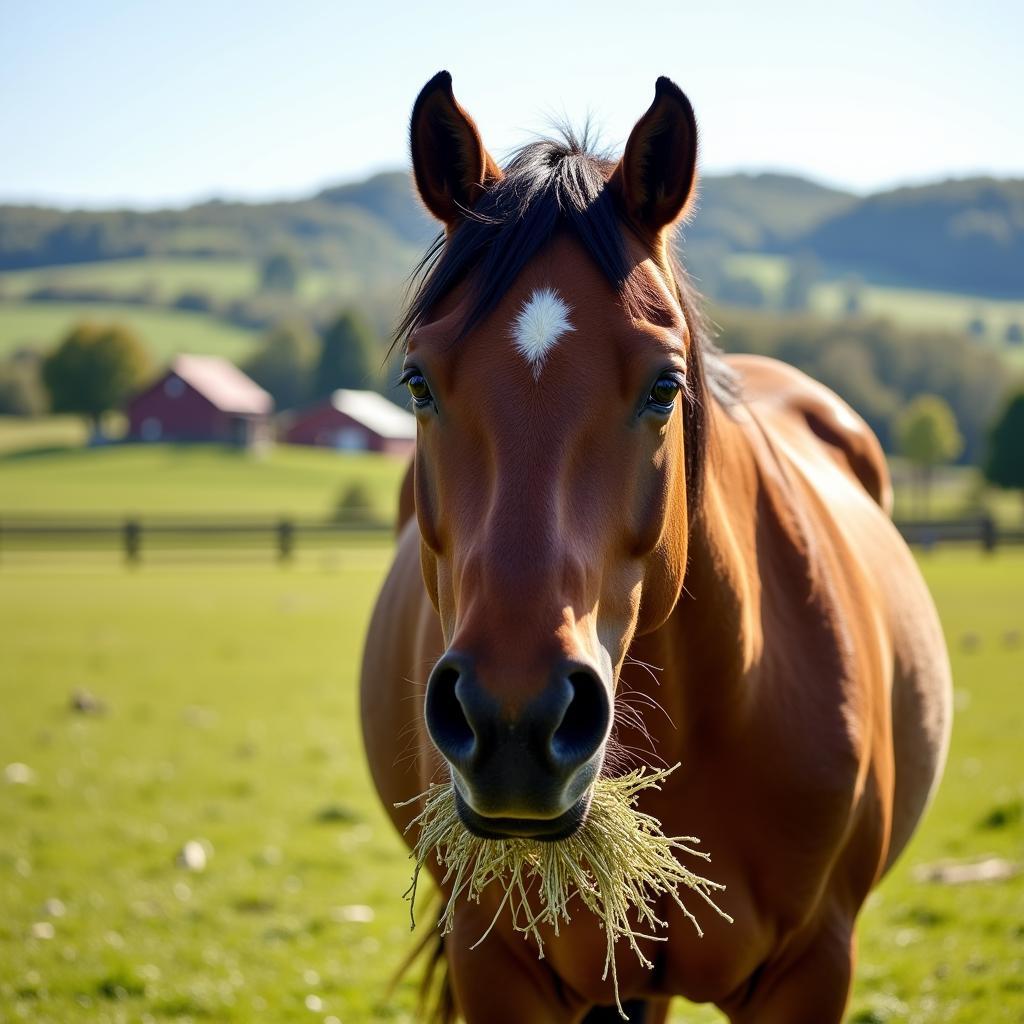Can A Horse Eat Corn? This is a common question among horse owners. While corn isn’t inherently toxic to horses, its role in their diet requires careful consideration. Feeding corn to horses is a bit like walking a tightrope – it can be done, but it needs to be approached with caution and a good understanding of the potential benefits and drawbacks. Just like humans, horses have unique dietary needs. Understanding these needs is key to ensuring your equine companion thrives.
Feeding your horse isn’t just about filling their belly; it’s about providing the right nutrients in the right proportions. This ensures they have the energy for work and play, maintain a healthy weight, and have a glossy coat. Is corn the right choice for your horse? Let’s delve deeper. Check our great selection of breast straps for horses.
Understanding the Equine Digestive System
Horses have a unique digestive system designed to process large amounts of forage. Their stomachs are relatively small, and the majority of digestion takes place in their hindgut, a complex ecosystem of bacteria that break down fiber. This delicate system can be easily disrupted by sudden dietary changes or excessive amounts of grain, including corn.
The Role of Fiber in a Horse’s Diet
Fiber is the cornerstone of a horse’s diet. It provides the essential nutrients and energy they need to thrive. Hay, pasture grass, and other forage sources are rich in fiber and should form the bulk of your horse’s daily ration. While grains like corn can supplement their diet, they should never replace forage.
Can Horses Eat Corn: Benefits and Risks
Corn can be a valuable source of energy for horses, especially those with high energy requirements, such as performance horses. However, it’s a double-edged sword. Feeding too much corn can lead to several health problems. It’s crucial to find the right balance.
The Potential Benefits of Corn
- Energy Source: Corn is a highly digestible energy source, which can be beneficial for working horses or those needing to gain weight.
- Cost-Effective: Corn is often a more affordable grain option compared to others like oats.
- Palatability: Many horses find corn palatable, making it easier to incorporate into their feed.
The Risks of Feeding Corn Too Much
- Obesity: Corn is high in starch and sugar, which can contribute to weight gain if not fed in moderation.
- Colic: A sudden change in diet or excessive grain intake can disrupt the delicate balance of bacteria in the hindgut, leading to colic, a potentially life-threatening condition.
- Laminitis: Another serious concern is laminitis, a painful inflammation of the hoof. This condition can be triggered by excessive sugar and starch intake, including from corn.
- Dental Issues: While not directly caused by corn, horses with dental problems may have difficulty chewing whole corn kernels, potentially leading to digestive upset.
 Horse Eating Corn from a Bucket
Horse Eating Corn from a Bucket
How to Feed Corn to Horses Safely
If you choose to include corn in your horse’s diet, do so with caution. Start with small quantities and gradually increase the amount over several days, allowing the horse’s digestive system to adapt. Always consult with your veterinarian or an equine nutritionist to determine the appropriate amount of corn for your individual horse’s needs. You can also explore alternative feeding options, including various horse supply catalogs offering a wide range of feed choices.
Different Forms of Corn for Horses
Corn can be fed to horses in various forms, including:
- Cracked Corn: Easier to digest than whole kernels, making it a safer option, especially for horses with dental issues.
- Rolled Corn: Another readily digestible option, similar to cracked corn in its benefits.
- Steam-Flaked Corn: A processed form of corn that has been cooked and flattened, further increasing digestibility.
- Whole Corn: Less digestible and should be avoided, especially for horses with dental problems.
 Various Forms of Corn for Horses
Various Forms of Corn for Horses
“When introducing corn into a horse’s diet, start slowly and monitor the horse for any signs of digestive upset,” advises Dr. Emily Carter, DVM, an equine veterinarian with over 15 years of experience. “Each horse is different, and what works for one might not work for another.”
Is Corn Right for Your Horse?
Whether or not to feed corn to your horse is a decision that should be made in consultation with your veterinarian. Factors to consider include your horse’s age, activity level, overall health, and current diet. When properly managed and fed in moderation, corn can be a valuable addition to the diet of some horses. However, it is crucial to remember that forage should always be the foundation of any equine diet.
Properly fitting your horse’s tack is also crucial for their comfort and well-being. For guidance on measuring a horse for a saddle, visit our comprehensive guide. Maintaining a safe and comfortable environment for your horse is also important, and choosing the right horse stall door can make a big difference.
 Healthy Horse Eating Hay
Healthy Horse Eating Hay
“Remember, forage should always be the priority,” emphasizes Sarah Miller, a certified equine nutritionist. “Corn should only be used as a supplement to meet specific energy requirements, never as a replacement for quality hay or pasture.”
Conclusion: Feeding Corn to Horses Responsibly
Can a horse eat corn? Yes, but it’s not a simple yes or no answer. While corn can provide energy, overfeeding can lead to health problems. Prioritize forage, introduce corn gradually, and consult your veterinarian for personalized advice. Choosing the right nutrition for your horse is essential for their health and happiness. For those looking to transport their horses, consider exploring options for 2 horse horse trailers for sale.
FAQ
-
What are the signs of corn overload in horses? Signs may include colic, laminitis, weight gain, and changes in manure consistency.
-
Can all horses eat corn? Not all horses tolerate corn well. Those prone to laminitis or metabolic issues should avoid it.
-
What’s the best way to introduce corn to a horse’s diet? Start with very small amounts and gradually increase over several days, monitoring for any adverse reactions.
-
Is cracked corn better than whole corn for horses? Yes, cracked corn is easier to digest, especially for horses with dental problems.
-
Can I feed corn to my miniature horse? Miniature horses are particularly susceptible to metabolic issues and should be fed corn with extreme caution.
-
How much corn should I feed my horse? Consult your veterinarian or an equine nutritionist for specific recommendations based on your horse’s individual needs.
-
What should I do if my horse shows signs of illness after eating corn? Contact your veterinarian immediately.
Need More Help?
For any assistance with your horse’s nutritional needs or other horse-related queries, please contact us at Phone Number: 0772127271, Email: [email protected] or visit us at QGM2+WX2, Vị Trung, Vị Thuỷ, Hậu Giang, Việt Nam. Our 24/7 customer support team is ready to assist you.